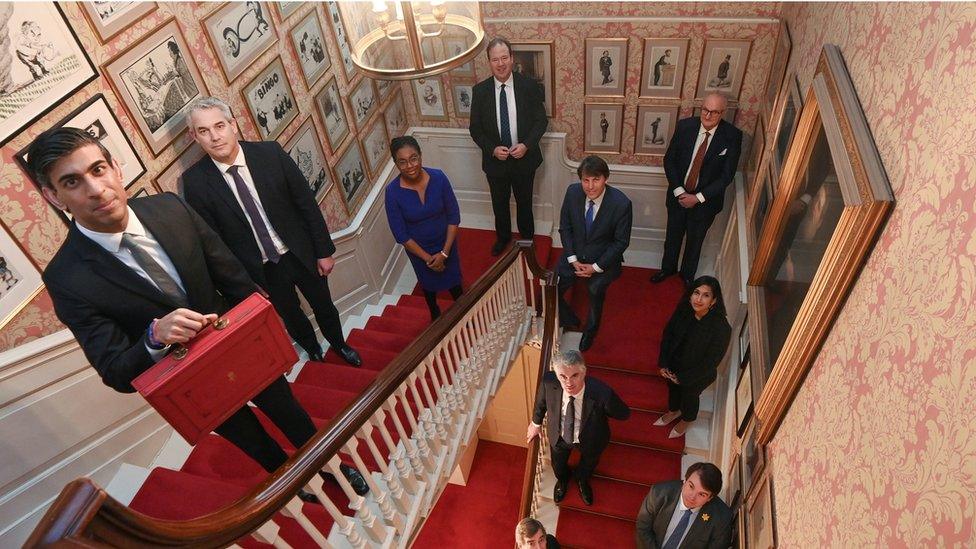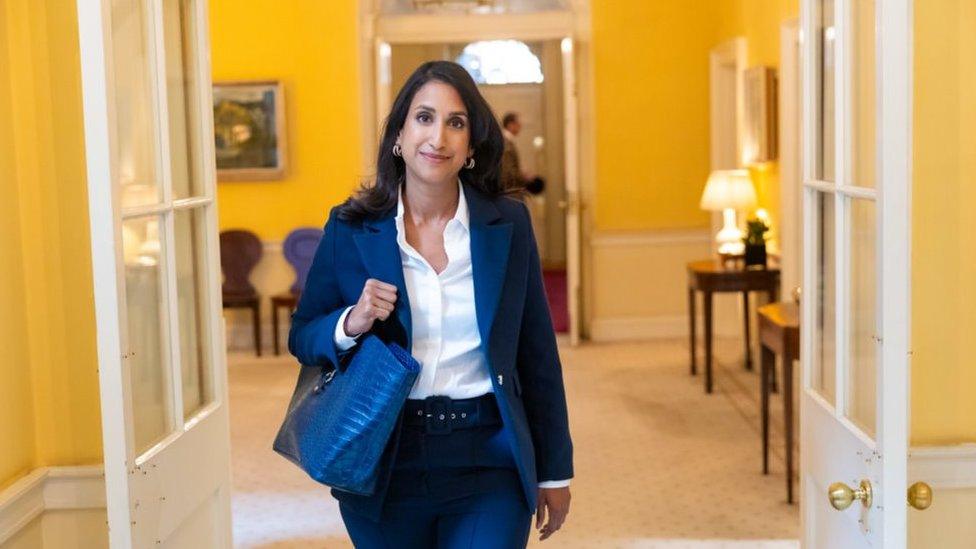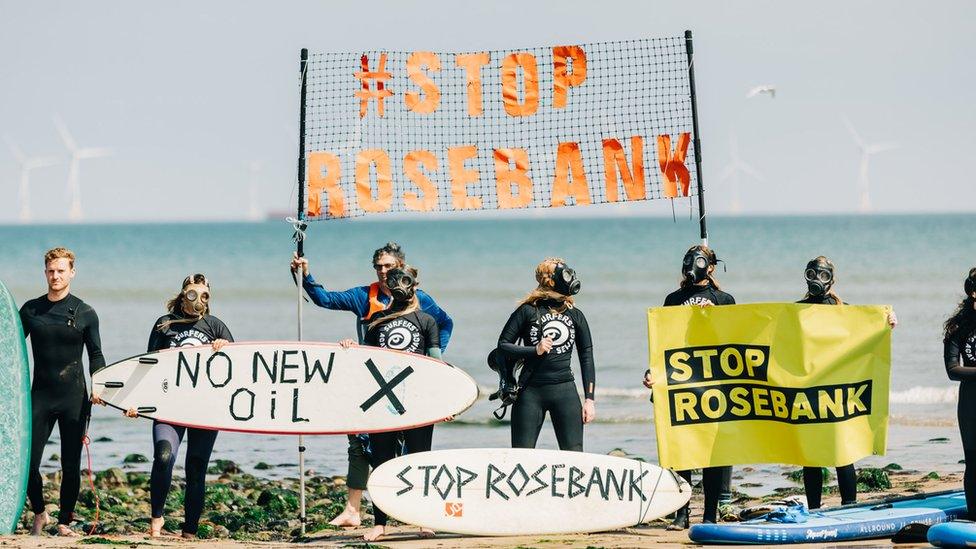Claire Coutinho: Who is the new energy secretary?
- Published

Claire Coutinho (right) served as an adviser to Rishi Sunak when he was at the Treasury in 2020
Claire Coutinho has been appointed the new secretary for energy security and net zero, replacing Grant Shapps.
It is a massive promotion for the East Surrey MP who was only elected to Parliament in December 2019.
In her previous job as parliamentary under-secretary of state with responsibility for childcare she wasn't even at the rung below the cabinet, but the rung below that.
Rishi Sunak's decision to catapult her into the cabinet - as its youngest member in fact - marks her out instantly as a major figure in Conservative politics, present and future.
She is the first member of the large 2019 intake of Tory MPs to make it to the cabinet table.
Her new department is responsible for steering how the UK responds to climate change, including ensuring the UK meets the target of reducing its greenhouse gas emissions to net zero by 2050.
This will involve deciding what type of energy we use, where we get it from and if we can rely on supply, including fossil fuels and renewable energy.
With contrasting views within the Conservative Party over how to handle the issue, it will be a tricky job but the huge vote of confidence from the prime minister in giving her the role is not too much of a surprise.
Before entering the Commons for the safe seat of East Surrey, Coutinho, 38, was an adviser to Mr Sunak, who at the time was chief secretary to the Treasury.
When Mr Sunak became chancellor in 2020 they effectively continued the partnership, with Ms Coutinho serving as his parliamentary aide.
She was a leading behind-the-scenes figure in Mr Sunak's leadership campaigns last summer, and is widely seen to have performed impressively as a minister at a time when childcare has rocketed up the political agenda.
Like the prime minister, she is the daughter of immigrants. Her parents came from India to the UK in the 1970s where they worked as doctors.
Ms Coutinho herself was born in London in 1985 and attended the fee-paying James Allen's Girls' School in East Dulwich.
She went on to study maths and philosophy at Exeter College, Oxford University.
After leaving university she worked for investment bank Merrill Lynch, influential right-leaning think tank the Centre for Social Justice and the Housing and Finance Institute, a not-for-profit organisation which aimed to help improve house building.
In 2012, she also set up the Novel Diner - an events company which hosted dinners based on books including the Great Gatsby, Charlie and the Chocolate Factory, American Psycho and the Bell Jar. The company, which she ran with food writer Mina Holland, dissolved in 2015.
Ms Coutinho also appeared as a contestant in Channel 4's The Taste, a cooking reality show in which Nigella Lawson and Anthony Bourdain judged the participant's dishes.

Claire Coutinho pictured in Downing Street shortly after her appointment
In the end, a career in politics, not cooking, proved the more tempting.
In December 2019, she stood for Parliament in the turbulent general election, a campaign dominated by Brexit, something she supported in the 2016 referendum.
She ran in the Conservative stronghold of East Surrey, where the previous Tory MP Sam Gyimah had defected to join the Liberal Democrats.
Having secured a 24,000 majority, she headed to Westminster, joining the most diverse House of Commons ever.
In September 2022, she became minister for disabled people in the Department for Work and Pensions under Liz Truss. Just over a month later, when Mr Sunak became prime minister, she was given a ministerial job in the Department for Education.
Now she is being entrusted with a true political hot potato. The Conservatives remain committed to net zero - indeed the 2050 target is written into law - but the more precise question of how to achieve it is increasingly controversial within the party.
Keeping all wings of her fractious party on side will test more than just Ms Coutinho's loyalty.
Key challenges in new role

The future of drilling at Rosebank oilfield is one issue that will be in Ms Coutinho's new in-tray
According to Jess Ralston, an energy analyst at the Energy and Climate Intelligence Unit, Ms Coutinho's new in-tray is "pretty full with documents that should be marked urgent".
Issues like phasing out fossil fuel boilers, enacting a promise to overturn a ban on onshore wind, and limited progress on installing more heat pumps will need to be resolved, she says.
A decision on whether to pump oil and gas from the controversial Rosebank oilfield in the North Sea is also expected soon.
And coming up in November is COP28 - the annual global UN climate summit - where the UK will be expected to present its progress on tackling its role in climate change.
Ms Coutinho has not said much about climate change in Parliament, although she did use her first speech in the House of Commons to pay tribute to the renewable energy sector in her constituency.
She was also previously a member of the Conservative Environment Network, a group of green-minded Tory politicians, and vice chair of a parliamentary group studying how the finance sector could contribute to reaching the net zero target.
Earlier this year she expressed opposition to the expansion of London's Ultra Low Emission Zone, which aims to cut traffic emissions by imposing a daily charge on the most polluting vehicles.